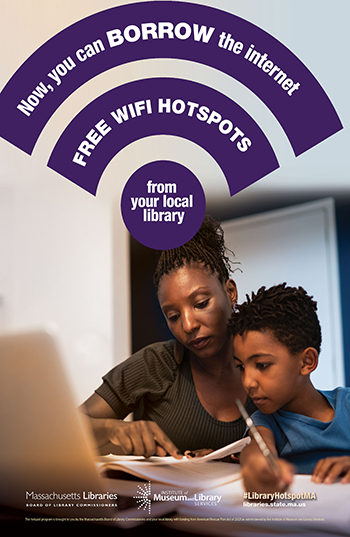November 17, 2021
IMLS staff interviewed chief officers of State Library Administrative Agencies (SLAAs) to discuss their response to the pandemic, including the use of IMLS American Rescue Plan Act (ARPA) funds to the states. These interviews have been edited for length and clarity. Because of the infrastructure of the Grants to States program and the agility of SLAAs, $178 million was rapidly rolled out to benefit libraries and their patrons across the country, and in some cases, museums, and tribes. This post is part of a series and features IMLS Senior Library Program Officer Michele Farrell interviewing James Lonergan, Director of the Massachusetts Board of Library Commissioners (MBLC). Read more about the Massachusetts’ priorities in the state profile for Massachusetts.
Michele: What approach have you taken with ARPA stimulus funds, including mechanisms you have used to distribute them?
James: We received $622,796 in CARES Act and $3.5 million in ARPA funds. I am so impressed by the work done by MBLC staff, the Commissioners, and the entire Massachusetts library community. It was a scramble to go fully remote, to not drop the ball, and be nimble and responsive.
We had conversations with our State Advisory Council on Libraries and listening sessions for librarians as we developed our agency strategic plan last year, so when COVID hit we felt well informed about the needs in the Commonwealth.

Given IMLS’s top priority for ARPA funding is digital inclusion, we decided to focus on a hotspot lending program. When we did a survey of libraries to gauge their interest, we heard that about 50% of libraries had not done a hotspot lending program before. We are providing roughly 3,000 hotspots to 200+ libraries and can support this program for 14-15 months with federal funds. After which hopefully individual libraries will take over and continue lending most of the hotspots. We also set up a user group to provide helpful guidance and discussion on their experience with hotspot lending programs.
We supported libraries in the 20 cities and towns that Governor Baker prioritized during the pandemic, considering case rates, the social determinants of health, and the disproportionate impact on Black, Indigenous, and people of color in our communities. We offered “Communities Hard Hit By COVID” grants in the $25,000 to $50,000 range. Some libraries are offering innovative and needed services such as bookmobile vans with Wi-Fi that go out to early learning centers. Libraries were encouraged to lend hotspots to individual patrons and also to community centers and different organizations in their communities, where they could leave the hotspots for extended periods for people who have trouble connecting to the Internet.
The Massachusetts Library System (MLS) is our statewide consortium. We gave them over $300,000 in CARES Act funds for Sora, a database of eBooks and audiobooks for school libraries. Schools are thrilled that these e-resources are available, and we saw e-resource usage go through the roof particularly during the early days of the pandemic.
We also supported the Boston Public Library, which serves as our Library for the Commonwealth (LFC), with $117,000 in CARES Act funds for e-resources to support students, job seekers, and adult learners. We will continue this support for e-resources for both MLS and LFC for another fiscal year using ARPA funds.
Another great program started with CARES Act, and continuing with ARPA funds, is teen mental health training for library staff, from an organization called Walker Cares. It “sold out” within days and we are scheduling future sessions, since we have been told it has been hugely helpful for staff working with young people.
We’re also partnering with our talking book libraries including the Perkins Library and the Worcester Talking Book Library in central Massachusetts to help support their users with ARPA funds.

Michele: Tell us about your experiences in working with new or existing partners during this time, what kinds of resources have you been able to tap into because of partnerships?
James: With CARES Act funds we offered subgrants to libraries and they partnered in some cases with local museums and historical societies. With the hotspots purchased with ARPA funds we are seeing some communities partner with either local senior centers or homeless shelters.
We are continuing our work with the Boston Bruins. We’re also partnering with Boston Pride, our professional women's hockey team. We did in-person outdoor summer programing this year using our regular LSTA funds, and I think folks were thrilled. We set up a calendar on our website for virtual programming statewide that was harvested from local libraries’ websites, and that was popular. People didn’t have to drive a couple hours to get to one of our meetings and they could make public input or attend a program.
Inclusion is important, and a silver lining of COVID is that it's helped us to be more accessible by providing options. I think it's a good thing that those who can’t make it somewhere in person or prefer to do something from home can participate if they have online access.
Michele: How have you seen libraries in your state shift to respond to the coronavirus pandemic, and how have you shifted to support them?
James: Outdoor and virtual programming is a big shift. We had used CARES Act funds to support virtual programming through subgrants, and along with most libraries in the country, Massachusetts libraries offered curbside service.
While guidance affecting libraries was changing regularly during the pandemic, we partnered with the Massachusetts Library System and were successful in getting the Reopening Advisory Board to specifically include libraries in their phased reopening guidelines.
The last 18 months have been very challenging, but it’s preparing us for potential future pandemics and disruptions that libraries need to be prepared for. That's why strategic planning, disaster planning, and being connected with local municipal officials is important. Our strategic plan and our mission note that we're all about equal access and serving underserved communities, but we must redouble our efforts.
The Massachusetts Board of Library Commissioners came out with a library space planning tool which we provided to colleagues of the Chief Officers of State Library Agencies (COSLA), and we added a pandemic addendum about the importance of flexible design, looking at outdoor spaces, and HVAC. Going forward I think libraries need to make the physical facilities and library programming resources as accessible as possible.